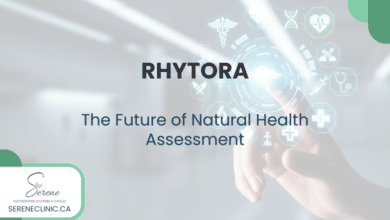The Connection Between Gut Health and Pregnancy Outcomes

Discover natural, evidence-based support for postpartum mood shifts with a Naturopath doula in Toronto. Learn how Serene Clinic’s licensed Naturopathic doula Toronto in our Doula clinic can help you find emotional balance after birth.
In recent years, the role of gut health in overall well-being has become a major focus of scientific research. While many of us are aware of the gut’s importance in digestion, emerging studies suggest that the health of the gut microbiome plays a significant role in pregnancy outcomes. The gut is not just a digestive system; it is a complex ecosystem that affects many aspects of the body, including metabolism, immunity, and even the hormonal balance, all of which are crucial during pregnancy.
In this article, we will explore how gut health influences pregnancy, its impact on maternal and fetal health, and how nurturing the microbiome can potentially improve pregnancy outcomes.
Understanding the Gut Microbiome
The gut microbiome refers to the trillions of bacteria, viruses, fungi, and other microorganisms that live in the digestive tract. The balance of these microorganisms is crucial to maintaining proper digestion, immune function, and overall health. A diverse and balanced microbiome is associated with better health outcomes, while an imbalance (dysbiosis) may contribute to various health issues.
The gut microbiome plays an essential role in regulating inflammation, metabolism, and immune system function, all of which are particularly important during pregnancy. The state of the microbiome can influence pregnancy outcomes in numerous ways, ranging from nutrient absorption to inflammation regulation and even fetal development.
How Gut Health Affects Pregnancy Outcomes
1. Impact on the Immune System
During pregnancy, the immune system undergoes complex changes to accommodate the developing fetus while still protecting the mother from infections. The gut microbiome plays a central role in immune function by helping to regulate immune responses and inflammation.
-
Immunoregulation: A balanced microbiome helps to prevent excessive inflammation, which is important in avoiding conditions like preeclampsia, gestational diabetes, and preterm labor. Dysbiosis (imbalance of gut bacteria) can lead to chronic low-grade inflammation, which can increase the risk of pregnancy complications.
-
Autoimmune Conditions: Some autoimmune diseases, such as rheumatoid arthritis or celiac disease, can be influenced by gut health. Poor gut health can exacerbate autoimmune responses, leading to complications such as an increased risk of miscarriage or preterm birth.
2. Influence on Gestational Diabetes
Gestational diabetes (GD) is a condition that affects pregnant women and is characterized by high blood sugar levels. While the exact cause is not fully understood, it is believed that gut microbiome imbalance may play a role in its development.
-
Insulin Resistance: An unhealthy gut microbiome can influence insulin sensitivity. Dysbiosis may lead to insulin resistance, a hallmark of gestational diabetes. This is because an imbalance in gut bacteria can affect how the body metabolizes glucose, leading to higher blood sugar levels.
-
Inflammation and Metabolic Health: Chronic inflammation and an unhealthy gut can also disrupt metabolic processes, making it harder for the body to regulate blood sugar. A healthy microbiome, on the other hand, supports better metabolic balance and may lower the risk of developing GD.
3. Preterm Birth and Low Birth Weight
There is evidence suggesting that an unhealthy gut microbiome may increase the risk of preterm birth and low birth weight.
-
Infections and Inflammation: An imbalance in the gut microbiome can lead to the overgrowth of harmful bacteria, which can trigger systemic inflammation. This inflammation may affect the uterus, leading to early contractions and increasing the risk of preterm labor.
-
Placental Health: The gut microbiome may also influence the health of the placenta, which is crucial for fetal growth and development. Inflammation and infections associated with gut dysbiosis can affect placental function and fetal growth, potentially leading to low birth weight.
4. Fetal Development and Birth Outcomes
The gut microbiome can impact fetal development in ways that are still being researched. During pregnancy, the maternal microbiome can affect the fetal gut microbiome, which influences early immune system development and overall health.
-
Microbial Transfer: The microbial environment in the mother’s gut is thought to influence the infant’s gut microbiome. During delivery, the infant is exposed to the mother’s microbiome through vaginal birth or, in some cases, a cesarean section. A healthy microbiome in the mother can promote the establishment of a balanced and diverse microbiome in the infant, which may lower the risk of autoimmune diseases, allergies, and obesity later in life.
-
Nutrient Absorption: Gut bacteria play a role in nutrient absorption, which is particularly important during pregnancy. Gut health influences the absorption of key nutrients like folate, iron, and calcium, which are essential for fetal development. A well-balanced gut microbiome can improve nutrient availability to both mother and baby.
5. Mental Health and Pregnancy
Maternal mental health is an important aspect of pregnancy outcomes, and emerging research suggests that the gut microbiome may be involved in regulating mood and reducing the risk of conditions like postpartum depression (PPD).
-
Gut-Brain Axis: The gut and brain are connected via the gut-brain axis, a communication pathway that links the gut microbiome with the central nervous system. An imbalance in the gut microbiome may disrupt this connection, leading to mood disturbances, anxiety, and depression, particularly in the postpartum period.
-
Inflammation and Mood: Chronic inflammation from gut dysbiosis has been linked to depression and anxiety. A balanced gut microbiome can help reduce inflammation and support emotional well-being, potentially reducing the risk of postpartum depression.
How to Support Gut Health During Pregnancy
Supporting a healthy gut microbiome during pregnancy can positively impact both maternal and fetal health. Here are some naturopathic strategies to enhance gut health:
1. Probiotic-Rich Foods
Probiotics are beneficial bacteria that help maintain a healthy balance in the gut microbiome. Consuming probiotic-rich foods can help promote a healthy gut and may improve pregnancy outcomes by supporting the immune system and reducing inflammation.
-
Sources: Yogurt (with live cultures), kefir, kimchi, sauerkraut, miso, and kombucha.
2. Prebiotic Foods
Prebiotics are non-digestible fibers that nourish beneficial gut bacteria. A diet high in prebiotics can help promote the growth of good bacteria and improve gut health.
-
Sources: Garlic, onions, leeks, asparagus, bananas, and whole grains.
3. Balanced Diet with Fiber
A high-fiber diet is essential for gut health as it helps maintain regular bowel movements, supports the growth of beneficial bacteria, and prevents constipation (which is common during pregnancy).
-
Sources: Fruits, vegetables, legumes, and whole grains.
4. Avoiding Processed Foods
Highly processed foods, which are often high in refined sugars and unhealthy fats, can disrupt the balance of the gut microbiome and promote the growth of harmful bacteria. Reducing processed food intake and focusing on whole, nutrient-dense foods can help maintain gut health.
5. Hydration
Drinking plenty of water supports digestion, helps maintain a healthy gut lining, and facilitates the removal of toxins. Adequate hydration is particularly important during pregnancy, as it aids in nutrient absorption and keeps the digestive system functioning optimally.
6. Supplements
In some cases, a naturopathic doctor may recommend probiotic supplements or prebiotic fibers to help support gut health during pregnancy, especially if there are specific concerns such as gut dysbiosis, infections, or a history of digestive issues.
Conclusion
The connection between gut health and pregnancy outcomes is increasingly recognized in both scientific and naturopathic circles. A healthy gut microbiome plays a critical role in immune function, metabolism, fetal development, and even mental health during pregnancy. Supporting gut health through a balanced diet, probiotic-rich foods, and lifestyle modifications can help improve pregnancy outcomes and contribute to overall maternal and fetal health.
By nurturing the gut microbiome during pregnancy, expectant mothers can potentially reduce the risk of complications like gestational diabetes, preterm birth, and mood disorders. If you are pregnant or planning to conceive, it’s advisable to work with a healthcare provider, such as a naturopathic doctor, who can provide personalized guidance on optimizing gut health for a healthier pregnancy and postpartum experience.
Serene Clinic Naturopathic Medicine Book Your Free Consultation Today
Connect with a Naturopathic Doctor and Doula near you, whether you are in Toronto or anywhere in Ontario.
Serene Clinic Naturopathic Doctors Book your complimentary meet and greet with an Ontario licensed Naturopathic Doctor and Doula:
https://sereneclinic.janeapp.com
This article is for informational and educational purposes only and is not intended as a substitute for medical advice, diagnosis, or treatment. Always seek the advice of your physician or other qualified health care provider with any questions you may have regarding a medical condition.
No. A Naturopathic Doctor ensures all remedies are safe and complement your current prescriptions.
Yes! Our Naturopath doula visits often qualify under extended health plans.
No. Baby blues are common and short-lived. PPD requires targeted support.
As early as day 1. We recommend booking at least 1 prenatal visit in advance.
Absolutely. All birthing experiences are welcome at our Toronto doula center.
Yes! We work collaboratively with your medical team for integrative, whole-person care.






